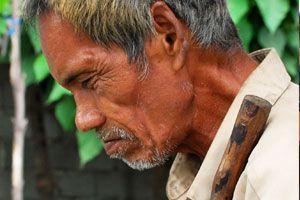
Kahdil's Story
Kahdil (*name has been changed) and all his siblings live together with their old grandmother in a small, square hut with only a bed. Kahdil’s grandmother moves slowly, with a hunched back, around their compound each day- gathering coconut leaves to make in to broomsticks to sell. This miniscule income is all the family has to live on. Kahdil’s father is a tricycle* driver, who left the family to move to a nearby city with his second wife, where he thought he would make more money. Unfortunately, because of new traffic regulations, Kahdil’s father was prohibited from driving his tricycle on the city highway, severely limiting the trips he could make.
Daily Challenges
With no extra support from his father and his grandmother's tiny income, Kahdil and his siblings do not have enough money for their daily needs or school allowance. They often walk long distances to school on empty stomachs. However, Kahdil has never allowed these conditions to quench his ambition. He is currently enrolled in his second year as a Mathematics Major at the local university. He gets good grades, receives Team Hope’s monthly scholarship allowance to help cover tuition and fees, and is determined to graduate.
A Relationship Restored
 During our weekly scholar meetings- in which we share a Bible story and discuss application questions- Kahdil vented feelings of hurt and resentment towards his father for abandoning their family. We encouraged him to focus on being a responsible older brother to his siblings, and to ask God for courage to talk with his father openly about his feelings of anger and resentment.
During our weekly scholar meetings- in which we share a Bible story and discuss application questions- Kahdil vented feelings of hurt and resentment towards his father for abandoning their family. We encouraged him to focus on being a responsible older brother to his siblings, and to ask God for courage to talk with his father openly about his feelings of anger and resentment.
In a recent meeting we asked, “What are you rejoicing in this week?” Kahdil broke into tears and shared that he is now on speaking terms with his father. When he had finally been honest with his father about his feelings, they cried together and Kahdil was able to extend forgiveness. Kahdil’s father is now doing his very best to support his son's education.
A New Hope
 Through Team Hope’s scholarship program, we have an exciting opportunity to impact students- not just on an educational level, but also on a deeply personal, emotional, and spiritual level. The monthly financial stipend, provided by outside donors, helps poor, tribal minority Muslim students remain in classes in order to graduate university. More importantly, monthly scholar workshops and weekly meetings with scholars in the community, build relationships of trust in which Bible stories are shared and Jesus is introduced to students without hope.
Through Team Hope’s scholarship program, we have an exciting opportunity to impact students- not just on an educational level, but also on a deeply personal, emotional, and spiritual level. The monthly financial stipend, provided by outside donors, helps poor, tribal minority Muslim students remain in classes in order to graduate university. More importantly, monthly scholar workshops and weekly meetings with scholars in the community, build relationships of trust in which Bible stories are shared and Jesus is introduced to students without hope.
*a common local form of public transportation; a motorcycle with a small passenger car attached
Pray for the SEND Hope & Light Campaign to mobilize more Christian workers into the Muslim World.
Give toward the expansion of Team Hope's Work in Southeast Asia.
Explore opportunities to go and partner with SEND Muslim ministry teams.
Additional Posts





